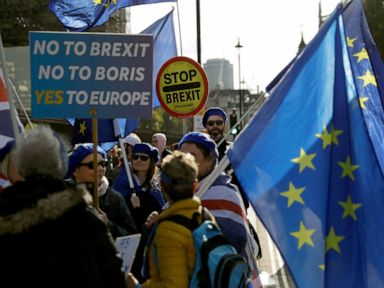
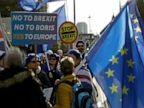

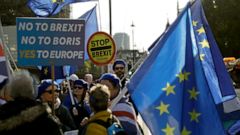
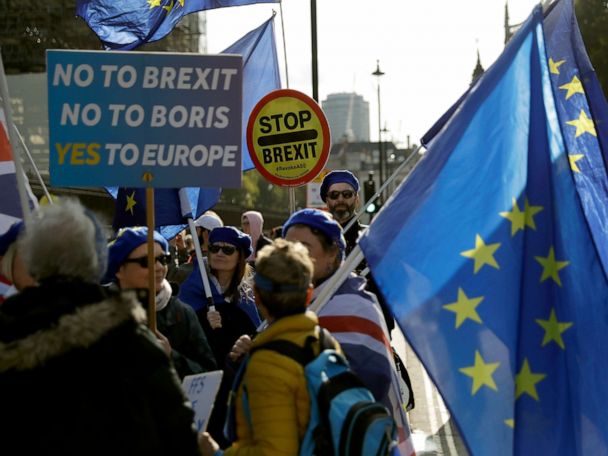
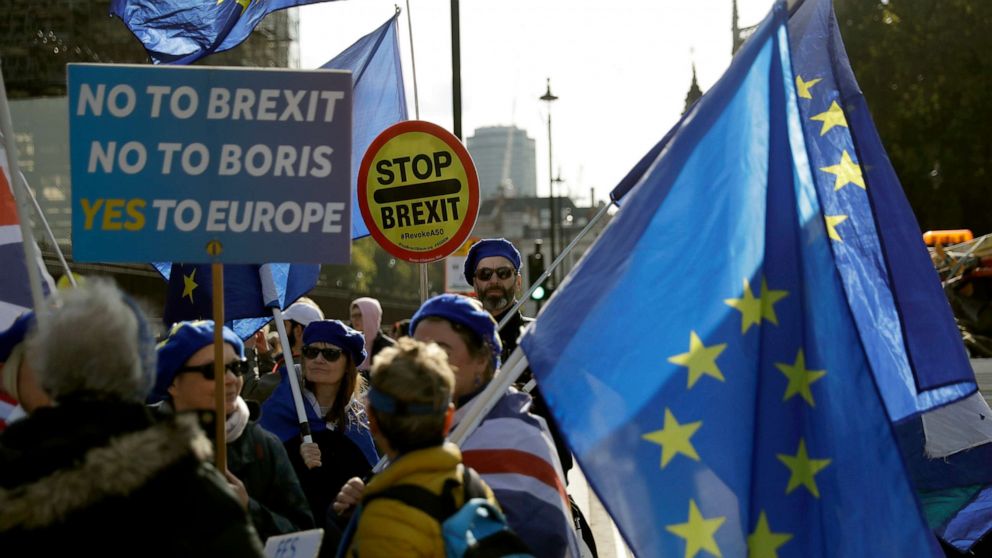

It’s not a trick or a treat.
At midnight on Halloween, almost 3 1/2 years after the Brexit referendum of 2016, the United Kingdom was — once again — supposed to be leaving the EU. Yet despite Prime Minister Boris Johnson’s “do or die” pledge to deliver, the U.K. remains an EU member state.
The thousands of coins that were reportedly minted to mark the day, have been melted down and recycled — a seemingly apt metaphor for Brexit, now delayed until Jan. 31, 2020. The deadline had been pushed back once before this year.
Eventually, the U.K. will come to a decision — leave or remain. But with no agreement, and no clear end in sight, will an election — slated for December — break the deadlock? What is it about Brexit itself that has proved such a conundrum? And is there anything that can unify a country that seems more divided than ever?
Johnson, Britain’s new prime minister, managed to reopen negotiations with the EU and produce a new deal, to replace the doomed agreement of his predecessor, Theresa May. However, like May, Johnson failed to get his own Parliament to act on it. Instead, fearing that there was not enough time to enact all the legislation needed for an orderly exit from the EU, lawmakers voted for a delay.
The next key date in the Brexit calendar is the general election on Dec. 12, which both sides hope will break the stalemate.
However, there are no guarantees that will be the case.
“That’s the big question: does [the election] deliver a decisive verdict either way?” Joseph Owen, the Brexit program director at the Institute for Government, told ABC News. If the opposition parties win, a second referendum would be in the cards. But the polls are suggesting the Conservative Party will win a majority, which means they’ll be able to pass their Brexit deal, according to Owen.
The campaign leading up to the election will likely see the Conservatives, led by Johnson, framing the central issue as Brexit vs. Remain. The Labour Party, led by Jeremy Corbyn, has advocated a “people’s vote” – i.e. a second referendum – to break the deadlock. Yet, as the 2017 general election, when May failed to win a majority on the “Brexit platform,” showed, the focus of a campaign could easily shift to other issues.
“We don’t know what will happen this time, but it seems like the Conservatives are certainly gearing up to run this on ‘getting Brexit done,’” Owen said. “The really interesting question will be to see if the traditional predictors of votes, the traditional tribes, being rewritten in favor of Brexit tribes and ‘leave vs remain.’”
Johnson, despite saying he would rather be “dead in a ditch” than delay Brexit past Oct. 31, has so far been hamstrung by the same problem as his predecessor. He simply did not have enough Conservative lawmakers in Parliament to pass his deal.
However, according to Quentin Peel, a former Financial Times journalist and associate fellow at the think tank Chatham House, part of the problem has been confusion about Brexit itself, and “none of the deadlines were realistic.”
“I think [the latest delay] was predictable because the government was divided on what sorts of Brexit it wanted and how it wanted to do it,” he told ABC News. “The country was divided. The Parliament was divided.”
After the referendum vote under May, the government went full speed ahead without a plan, according to Peel.
“That’s the first reason why there’s been such confusion and chaos, primarily the government itself being divided and having careened into the negotiations without any clear game plan,” he said. “But the second thing is that inevitably it was a far more complicated process than any of those committed to Brexit really had worked out.”
The main sticking point throughout the negotiations has been the problem of Northern Ireland. Caught between keeping a fluid border to maintain the peace process and delivering on a decisive Brexit, the issue proved crucial in May’s downfall. Johnson’s new deal effectively keeps Northern Ireland closely aligned to the EU, while the rest of the U.K. will have a more distinct economic relationship with the EU, Peel said.
While an election may promise to break the deadlock of Brexit v. Remain in favor of leaving with Johnson’s deal or a second referendum, the mood of the nation is “fed up,” according to John Rentoul, the Chief Political Correspondent for the Independent.
“It has been smart of Boris Johnson and Dominic Cummings, his chief of staff, to understand the power of the slogan, ‘Get Brexit Done’,” he said. “Many Remainers are frustrated, and would be relieved to get out.”
The country is even more divided than three years ago, when the U.K. voted to leave the EU by a margin of 52% to 48%, according to Rentoul. While he believes the most likely outcome is a Conservative victory, which would allow the U.K. to leave with Johnson’s deal. No outcome, he said, is going to heal that divide.
However, with any election there are no guarantees. If the vote on Dec. 12 does not deliver one of the main parties a decisive victory, the future will be as uncertain as at any time during the past three years.
There is no doubting, the sheer importance of the upcoming election.
“The general election will be absolutely key to see how we leave if we are at all,” Owen said. Even if lawmakers agree to a Brexit deal, however, that will not be the end of the process.
The next phase will determine what kind of trade agreement the EU will have with the U.K. “It’s not just the withdrawal, it‘s also about what comes next,” he said.

